Meet our Members: European Sex Workers Alliance
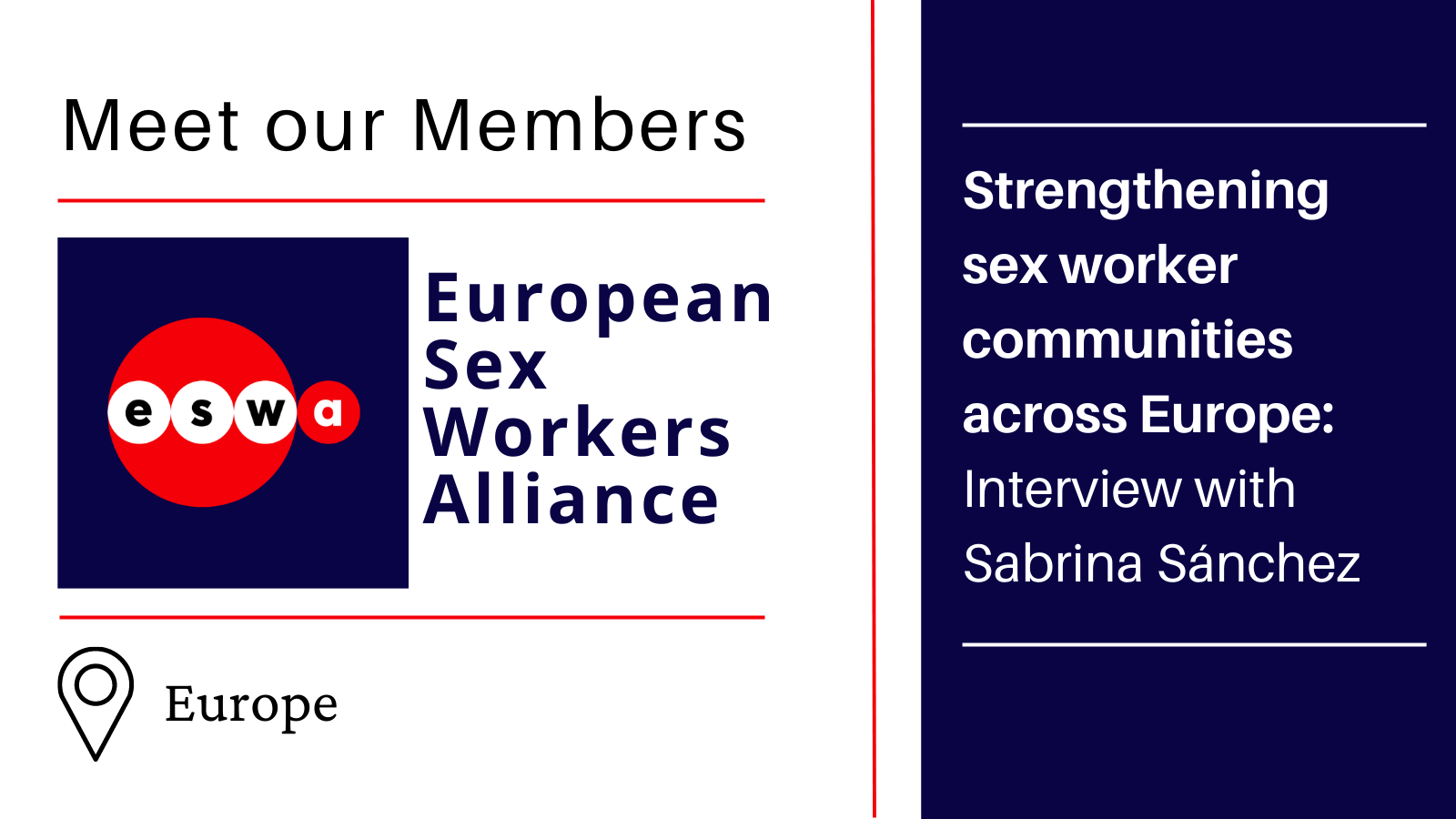
Lee la entrevista en español aquí
ESWA (European Sex Workers Rights Alliance) is a member organisation of GAATW in Europe. In July 2022, Emilia Cebrián from the GAATW secretariat conducted this interview with Sabrina Sánchez, Coordinator of ESWA, to learn more about ESWA’s work. The original interview was conducted in Spanish. It was translated into English by Jennifer Janssen and edited by Charlotte Clar from the GAATW Secretariat.
Emilia Cebrián: Thank you very much, Sabrina, for taking the time to do this interview with me. Let’s start with some history. How and why was ESWA founded?
Sabrina Sánchez: What is currently known as ESWA was born in 2005 out of a European-wide conference of sex workers, who saw a need to have a regional network that would bring together all the national organisations led by sex workers, with a focus on their human rights. It would also represent them at a regional level and carry out political lobby work with the European institutions, as well as facilitate exchanges among the different organisations. And this is how the International Committee on the Rights of Sex Workers in Europe (ICRSE) was born. ICRSE worked for nine years, for a long time without a budget but only with the volunteer work of those who made up the secretariat and the Board (which I was also a part of from 2017 until last year).
The formation of ESWA was an opportunity to get to know other sex workers, and to foster alliances and personal friendships. But it was only three years ago that we secured enough budget to have sex workers on payroll. We’re an organisation directed by people that our community. It is true that in a way we are from the privileged section of the sex worker community, most people are white, European, with knowledge of English and another language, and this is part of our internal debate. But it’s important to give sex workers the opportunity to be part of this type of work because NGOs usually prioritise the knowledge gained from academia or from previous experience in the field. But we always prioritise that sex workers work here.
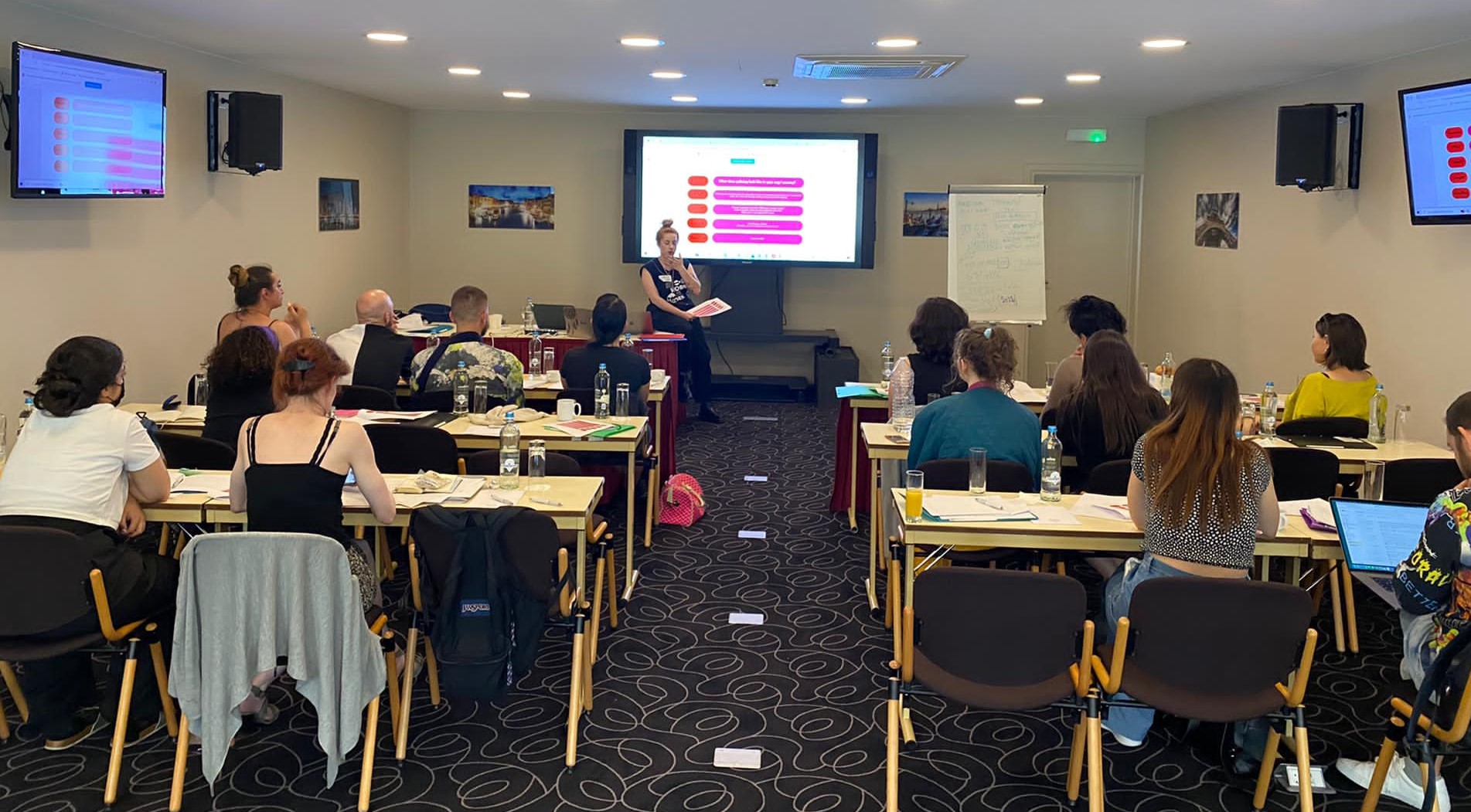 |
| Training on Feminist Participatory Action Research |
EC: The structure of ESWA has a lot in common with GAATW given that both organisations are membership alliances. What challenges and opportunities do you think the organisational structure brings?
SS: One of the advantages is that the organisation follows the path that the membership sets. I believe it is more democratic and open. Rather than being driven by a board, which even if it’s elected and supported by its membership, there’s always the possibility of it imposing its own criteria. As for the challenges, it's a very diverse membership. We have organisations of racialised, anti-racist, anti-capitalist, anti-prison people as well as organisations that include all people in the sex work industry. This means that often there are ideological differences that haven’t been resolved. One important conversation we constantly have as ESWA is linked to the structural racism within our work. Another challenge is the diversity of opinions that exists among the people and organisations that make up ESWA. We share a common position regarding the human rights for sex workers, but we differ in other ways.
EC: Yes, diversity is at the same time a great strength and a weakness; on the one hand, it allows for exchanges of perspectives and dialogue with diverse organisations that work in different contexts, and on the other hand, it can create difficulties when trying to come to an agreement.
SS: Yes. Another debate we have is about our relationship with the police. Many of us would prefer if it didn’t exist but if something happens, we have no other option but to seek help from the police. So we have to think how to tackle this, perhaps educate law enforcement so that they know how to treat us when we are the victims, but not because we are sex workers but because we can be victims of a crime. This is a constant debate and I think it’s important to have diversity of opinions. Our challenge as leaders of the organisation is knowing how to deal with this conflict between opposing views and to generate something productive out of it, and for it not to destroy our alliance and our work.
EC: What are the main issues you are working on and which communities do you work with?
SS: We work at the intersections of sex work with other issues. We share one basic principle is this is that most of the team and the board consider ourselves to be trans-inclusive feminists and we are within the framework of non-hegemonic feminism. One of our focuses is access to justice – not only to understand how sex workers access justice, but also to do political advocacy at the EU level, especially now that the EU Directive on Gender-based Violence is being discussed and some actors, amongst them the European social democrats, try to abolish prostitution. According to them, if prostitution is abolished there would be no human trafficking, but they don’t propose any other measures like regularisation of migrants that are already ‘in situation of prostitution’ or victims of trafficking. Many times, all they propose is voluntary reintegration to the country of origin, but in reality, that's just a way to get rid of unwanted migrants. Unfortunately, this narrative is accepted by many actors, and they are well-intentioned but as we know, the road to hell is paved with good intentions. For example, when it comes to assistance for return to the country of origin, that nobody wants to return because many people have to pay debts that they acquired while trying to come to Europe. They don't want to go home because they’re not safe there, and it's a very misogynistic narrative that your home is the safest place, it's where you were born, and you must not leave that place.
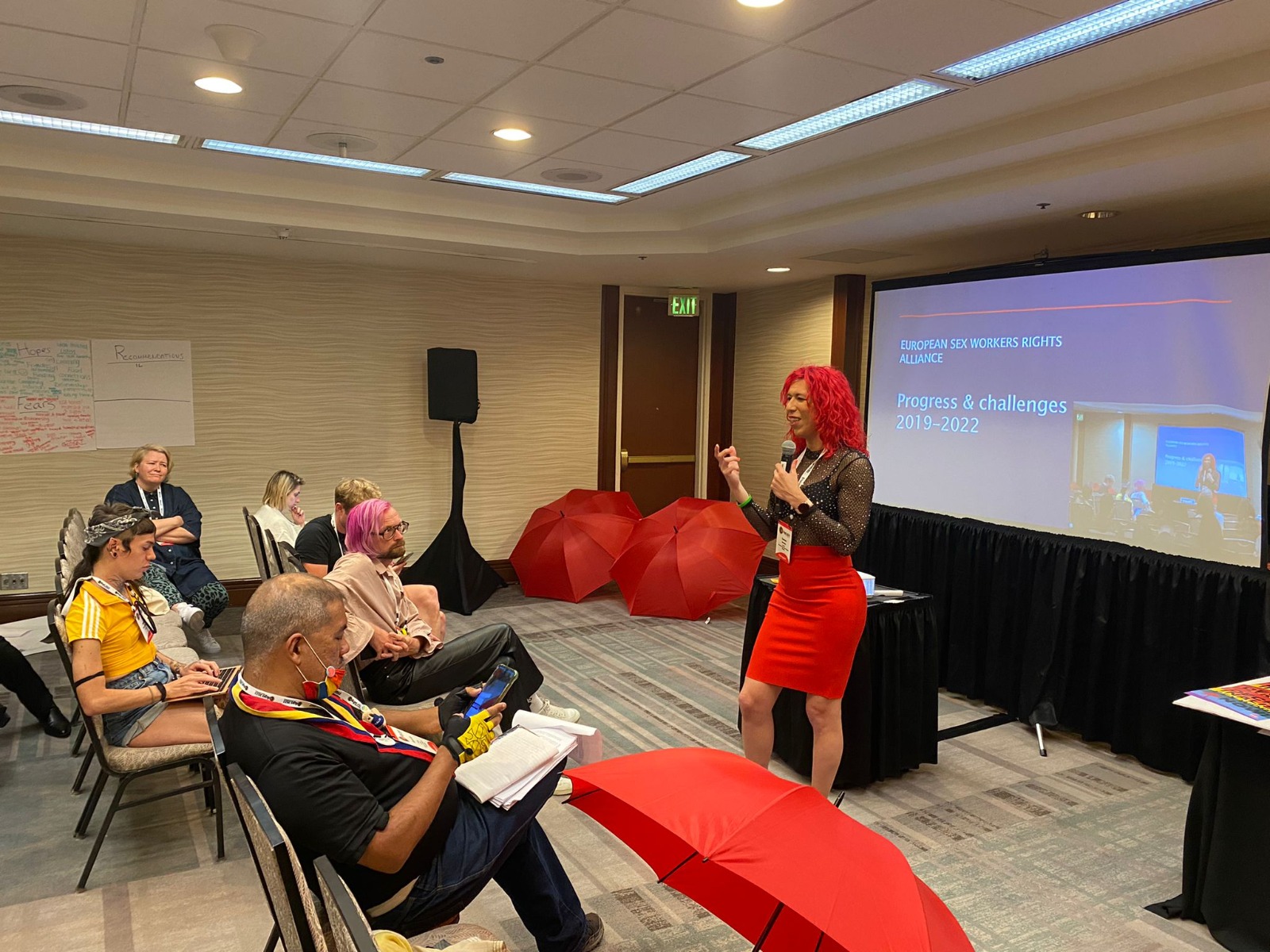 |
| Presentation by ESWA at ILGA-World’s conference |
Another area of our work focuses on digital rights, given that the internet is used by sex workers not just for work but also to avoid the police and middlemen, and to find independence and control over our work. But the internet is a gentrified space, and as always, the whores are the first people they want to get rid of. We face the censoring of our bodies, especially feminine bodies, and a series of prohibitions disguised as the fight against human trafficking. There’s this wrong idea that abolishing prohibition will solve certain problems when in reality these are structural problems, and so they end up restricting digital rights for the entire world.
A third area of our work is about anti-racism, something that in Europe goes hand in hand with migration since many migrants are racialised people. At the same time, border control is linked to digital control; there’s a research from StateWatch about digital surveillance from Europol, Frontex and all these other surveillance and control agencies. The truth is they are not really efficient because the structural causes are still there: there’s still a border, very restrictive immigration laws, and extractivism in the Global South that pushes people to migrate. So all these measures are like patches that cover up the reality that hyper-surveillance serves other interests.
A fourth area focuses on health, with regard to sex workers as an object of healthcare control as it has been traditionally, or as agents in the response to the pandemics. We have always been at the forefront when it comes to sexual health, while society has tried to control and stigmatise prostitutes as being the ones that transmit diseases. Since the HIV pandemic, many organisations have realised that we are allies in the fight against human trafficking and need the right tools, the necessary budget and collaboration with the authorities.
Lastly, since this year we are strengthening a research programme and we are very proud of it because it’s led by a sex worker living with a disability. We have strengthened our research capacity and we believe that from now on we can lead all our researches on sex work if we have funding and the necessary tools. Currently we are starting a research on policing and sex workers’ relationship with the police which will take place in Poland, France, UK, North Macedonia and Spain from the second half of 2022 and throughout 2023.
EC: Just like GAATW, ESWA works at the intersection of different issues and this can be seen clearly from the focus areas you talked about. Now I’d like to ask you about the situation of victims of trafficking with whom you work, directly or indirectly. What are the main challenges they face or what are the main dynamics of human trafficking at the moment?
SS: I believe there is a lack of commitment on the part of States to really support victims of trafficking and provide for their needs, not just those who are in Europe but also those in their country of origin. Generally, the trafficking networks that brought them here know where they live, who they are, and that's where you realise that the laws forget about the reality of these people. Many victims of trafficking have come here with the wish to provide for their loved ones back in their country of origin, but this is something that the States never provide, for example, the possibility family reunification. For the same reason, many people don’t collaborate with law enforcement because they don't believe that their families will be protected. There is also a lack of social measures. They grant them, for example, a residency permit for six months, but where and how is that person going to live with that permit? And what type of job can this person find? What is usually offered are just crumbs; there is never enough budget for the victims. Most anti-trafficking efforts are that there shouldn’t be any brothels, there or any women standing on the streets at night, but what happens afterward doesn't matter. The important thing is that they are not seen.
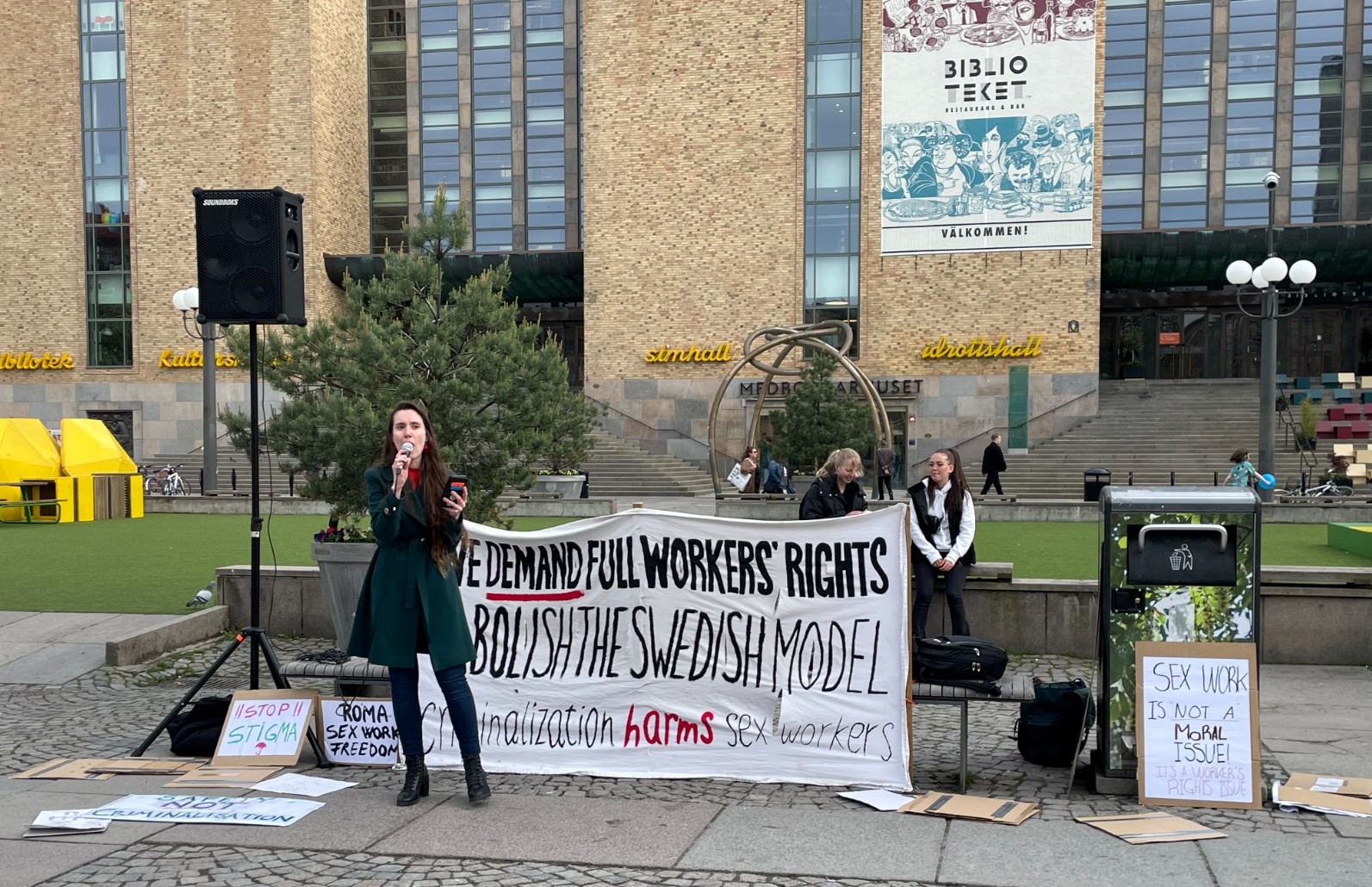 |
| Rally in support of sex workers’ rights in Sweden |
EC: We could say it's a patchy response that often disguises other interests…
SS: Yes, and then the legislation ends up creating precisely the conditions it aimed to combat. There are people who don't want sex work to exist and want to prohibit men from paying for sex. But they don’t see the other discriminations and oppressions we face, they don’t see that we are often forced to do sex work, as in the case with trans women. The truth is that those are are not only anti- trans, but also racist, colonialist, and classist. It is these patriarchal structures, capitalists, cis-heteronormative that must change; otherwise, it’s like trying to fight a cough from COVID and not the virus itself.
EC: Exactly, we must tackle the roots of the problem, not its symptoms. In what other ways does ESWA support the sex worker community?
SS: One of our fundamental pillars is education organisational capacity-building for project management, fundraising, and so on. We know that in Europe there is very little collective representation of racialised and migrant people, because when you are a migrant, you need to put all your energy into surviving and you have less time for activism. Because of this, in March we held the first BIPOC Sex Worker Academy (Academy for sex workers who Black, Indigenous and People of Colour). It consisted of three days of courses run by racialised people, one of them a sex worker. We believe that within certain organisations and in general European activism there are racialised people that have knowledge that we don't, and whenever we can, we invite them to share their knowledge with us. It is a programme that, personally, I would like to continue each year and if possible, in a language other than English, so that conversations outside the formal workshop can have a better flow. In the organisation we have always had the idea of how we can be useful to the community, offering this type of activities, and whenever possible subgranting.
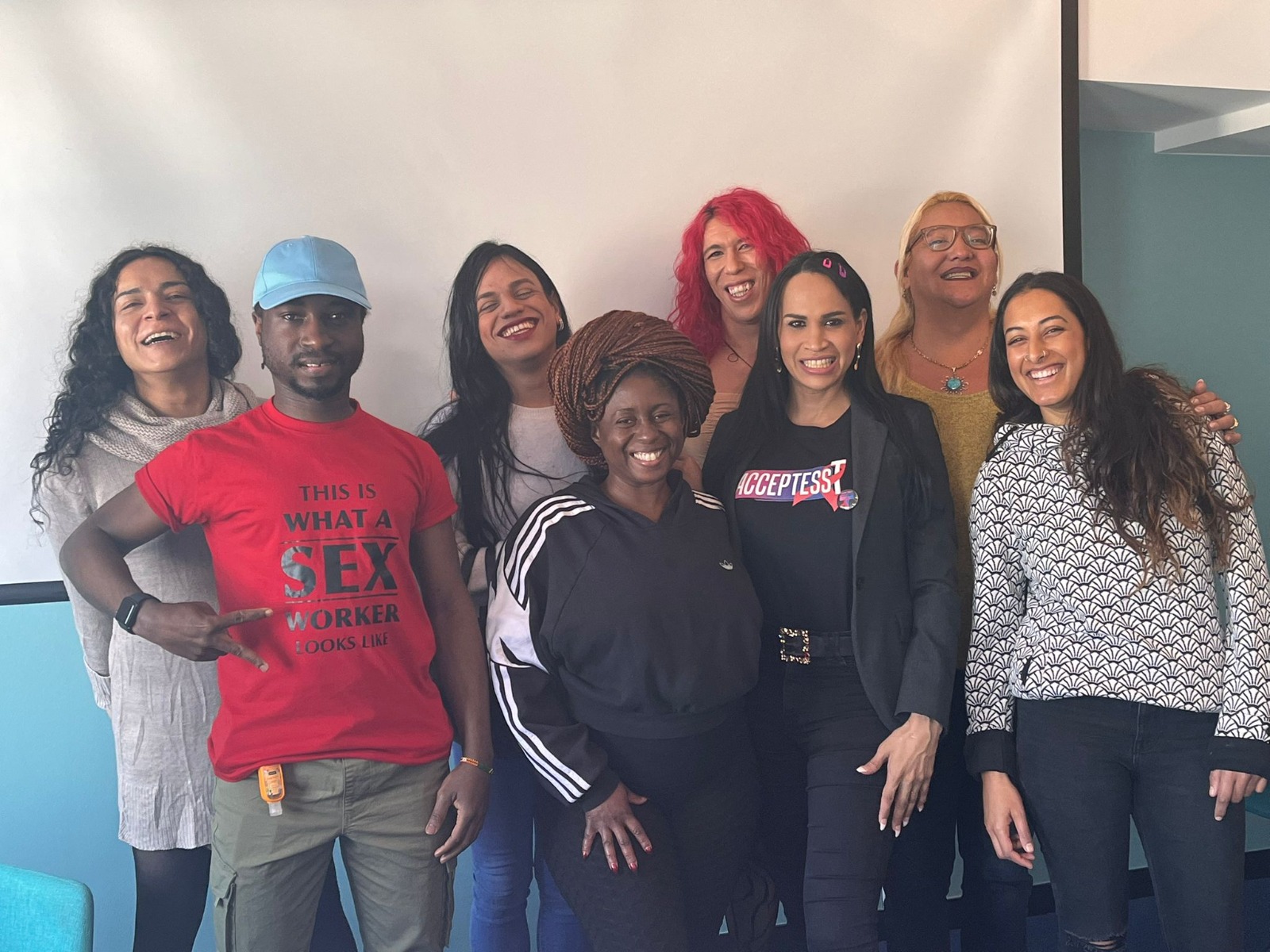 |
| Participants in the first ESWA BIPOC Sex Worker Academy |
EC: What type of courses or workshops were there at the BIPOC Sex Worker Academy?
SS: We worked with organisation, for example, how to manage projects from the start, develop a timeline, a budget, and so on. One of the workshops focused on fundraising, how to prepare a funding application, how to make financial and narrative reports. There was also a very interesting workshop on how to prepare an asylum application, which was run by a Nigerian sex worker living in Germany that managed to receive his refugee status. We worked on giving interviews and how to handle hostile people who do not understand what we are trying to convey, especially when it comes to race or sexual identity. This workshop was run by a Somali trans woman who is the Communications Officer of Transgender Europe. This initiative helped us collaborate more closely with other organisations to which we are already members.
EC: I don’t have any more questions. Would you like to add something else?
SS: No, we covered everything. Thank you very much.

